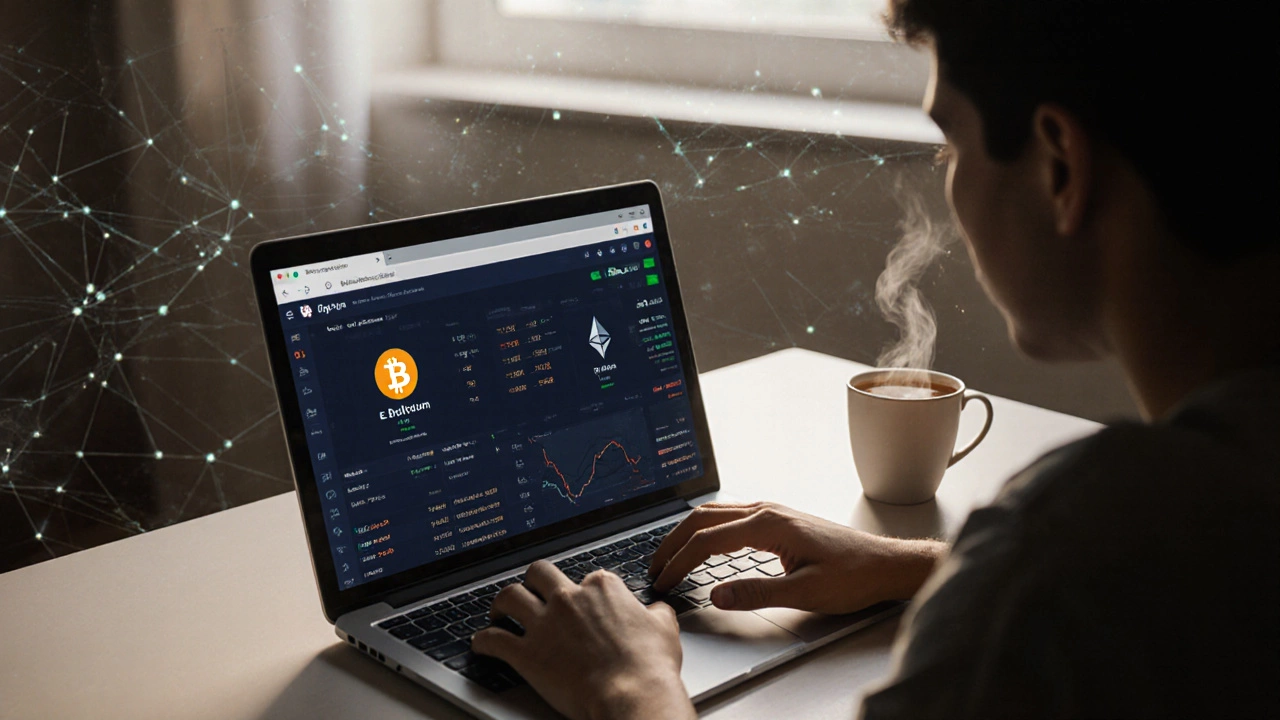Ever hear someone say trading crypto is just like gambling? They’re not totally wrong, but they’re not quite right either. People put their money into Bitcoin, Ethereum, whatever’s bouncing around Reddit or Twitter, hoping for quick returns. It can look a lot like making a wild bet at the poker table, especially if you don’t have much of a plan.
But if you peel back the hype, the story gets more interesting. Crypto prices do swing like crazy, sure, and you can lose your shirt if you dive in blind. Still, there’s a difference between trading on a whim and making well-thought-out moves based on research and strategy. One is a coin toss. The other? Think chess, not roulette.
If you trade just by following random tips or betting it all on some meme coin, yeah, you might as well be rolling dice. The real pros treat crypto trading more like a job. They set goals, know their limits, and never risk more than they can afford to lose. That’s not gambling—it’s risk management.
- How Crypto Trading Works
- The Similarities and Differences With Gambling
- Real Risks and Smart Risk Management
- Tips for Trading Responsibly
How Crypto Trading Works
Crypto trading is honestly pretty straightforward at its core: you buy cryptocurrency when you think the price will go up, and you sell it when you think the price will drop or you’re in profit. The goal is to make money from those ups and downs, just like folks do with stocks. But it’s 24/7—no closing bell on weekends or public holidays.
You’re trading digital assets like Bitcoin, Ethereum, or other so-called altcoins, using exchanges like Binance, Coinbase, or Kraken. All you need is an account, some funds (usually regular money, though some folks use other cryptos), and an internet connection. Thousands of digital coins exist, and hundreds are actively traded every day.
Let’s break down what happens when you’re trading:
- Market Orders: You set an order to buy or sell at whatever price people are offering right now. It’s fast and simple.
- Limit Orders: You say, “I’ll buy or sell, but only at this price.” If the price doesn’t hit your number, nothing happens.
- Stop-Loss Orders: You tell the system to automatically sell if your coin drops to a certain price so you don't end up holding the bag.
Most beginner traders stick to spot trading, where you own the actual crypto. More advanced users get into futures, options, or margin trading. That’s where things can get risky—lose more than you put in if you’re not careful.
It helps to know that crypto markets are crazy volatile. The price of cryptocurrency can bounce up or down 10% or even more in a day. In November 2021, Bitcoin hit $68,000, but just six months later, it had dropped to under $30,000. Massive swings happen all the time, especially with the small altcoins.
| Popular Crypto Exchanges | Daily Trading Volume (USD) |
|---|---|
| Binance | $30 billion+ |
| Coinbase | $2 billion+ |
| Kraken | $1 billion+ |
This space moves fast, and the action never stops. But whether you’re swiping on your phone or clicking on your laptop, knowing how crypto trading actually works puts you a step ahead of most people jumping in without a clue.
The Similarities and Differences With Gambling
Comparing crypto trading and gambling isn’t just some catchy headline—it’s actually grounded in real overlap. Both involve risking money with the hope of coming out ahead. If you buy a new coin just because everyone else is doing it, you’re basically betting on luck, not logic. That’s a lot like walking into a casino and choosing red or black on the roulette wheel.
Here’s where things start to split. Most forms of gambling are strictly about chance. You can’t control what number comes up, what cards you’re dealt, or where the ball lands. Sure, poker players use skill, but slots? Pure luck. In crypto trading, you have access to tons of data—price charts, news events, market sentiment, even advanced analytics.
"Gambling relies entirely on luck because the odds are designed so the house always wins. Smart traders use information to manage risk and improve their chances." — John Griffin, Finance Professor, University of Texas at Austin
Let’s break it down:
- Gambling: Mostly chance, many games have built-in odds that work against you (the house edge).
- Crypto trading: Mix of chance and skill. If you know what you’re doing, use stop-loss orders, and actually research projects, your odds get better.
A big difference lies in control. With crypto trading, you decide when to buy or sell. You can study charts, set up alerts, or automate your strategy. In gambling, once you play the hand, spin the wheel, or bet on the horses, there’s nothing more you can do.
Here’s a quick side-by-side look at the real deal:
| Factor | Crypto Trading | Gambling |
|---|---|---|
| Control | High (you pick timing, tools, assets) | Low (outcome mostly set by chance) |
| Skill/Strategy | Can make a big difference | Minimal, except for some games like poker |
| Data-driven Decisions | Key part of success | Rarely possible |
| House Edge | No fixed house edge | House always wins in the long run |
Bottom line? If you treat cryptocurrency like a slot machine, you'll probably end up like most gamblers—broke and annoyed. Treat it with respect, lean on real research, and you’ve got a fighting chance. It’s not about luck; it’s about having a plan and sticking to it.

Real Risks and Smart Risk Management
Let’s get real—crypto trading comes with some serious risks. Massive price swings can happen in hours, not weeks. It’s not uncommon for coins to drop 20% overnight, wiping out months’ worth of gains. One 2022 report from Glassnode showed that over 50% of all Bitcoin days end in moves of more than 2% up or down. Playing the market without a plan is asking for trouble.
Fraud and hacks are another headache. Lost money from crypto hacks in 2024 passed $1.7 billion worldwide, according to Chainalysis. Stories of folks losing everything from an exchange going bust pop up all the time. Forgetting your password? That’s another risk unique to cryptocurrency—unlike a regular bank, nobody’s letting you reset it.
So, how do you avoid ending up as another sad story on a subreddit? Here’s how the people who stay in the game manage their risk:
- Only trade with money you can afford to lose. Seriously, never bet the rent or your emergency savings. That’s gambling, not trading.
- Use stop-loss orders. These are tools that automatically sell your position if the price drops past a set level. It’s like a safety net for your investment.
- Don’t put everything into one coin. Spread your risk across a few different assets to soften the blow if one goes south.
- Stay informed. Check news, research the coins, and use charts. Quick decisions based on rumors are how people usually lose big.
- Set clear goals. Know if you’re trading for a quick flip or holding for years. Your strategy should match your timeline.
Check out a quick comparison of common risks in crypto trading and how to manage them:
| Risk | Example | How to Manage |
|---|---|---|
| Flash Crashes | Coin drops 30% in a day | Use stop-loss, diversify |
| Exchange Hacks | Exchange gets hacked, coins are gone | Store coins in your own wallet |
| Poor Research | Bought into a scam coin | Do your own research, double-check sources |
| Emotional Trading | FOMO buys at top, panic sells at bottom | Stick to your plan, ignore hype |
Treating crypto trading like a business and using smart risk management tactics can mean the difference between burning out fast or sticking around to see real results. Don’t let luck call the shots—make a plan and stick with it.
Tips for Trading Responsibly
When it comes to crypto trading, jumping in without a plan is like going all-in at a blackjack table with your rent money. If you actually want a real shot—not just a lucky win—good habits matter more than hype. Nothing’s guaranteed, but you can keep yourself from crashing hard by following a few tried and tested tips.
- Only invest what you can afford to lose. That old advice from every trading book? Still true. If you need the money for groceries or bills, don’t put it on Bitcoin hoping for a miracle. Treat your cryptocurrency budget like money for fun, not essentials.
- Use stop-loss orders and set targets. You can automatically exit a position if the price tanks, saving yourself from bigger losses. Set realistic profit targets too, so you don’t get greedy and lose gains you could’ve locked in.
- Don’t trade on rumors or FOMO. Crypto Twitter explodes every time something weird happens, and people pile in or bail out of coins based on nothing but hype. Slow down and do your own research.
- Understand volatility. Crypto prices can move 10% or more in a single day. According to CoinMarketCap data, Bitcoin has averaged about 4% daily volatility over the last three years, while some small altcoins swing 15% or more. Be ready for sudden ups and downs, both emotionally and financially.
- Keep records. Track every trade—what you bought, when you bought it, how much you paid. You’ll spot patterns, avoid repeat mistakes, and make tax season less of a nightmare.
- Keep learning. Markets change fast. Reading a single "expert" tweet doesn’t make you a pro. There are tons of free courses (Coinbase Learn, Binance Academy) and solid books (like "Cryptoassets" by Chris Burniske and Jack Tatar) if you want to step up your game.
Check out this quick breakdown of two types of crypto traders—the folks who gamble, and the ones who treat it as a real craft:
| Trait | Gambler | Responsible Trader |
|---|---|---|
| Strategy | None—bets on rumors, tips | Has a clear plan and sticks to it |
| Risk Management | All-in, no limits | Uses stop-losses, never risks it all |
| Education | Minimal—follows memes | Keeps learning, does research |
| Emotional Control | Panic sells or holds blindly | Maintains cool, follows strategy |
Chasing trends rarely works out in crypto trading. Make a plan, be patient and treat it like a real investment—not just a spin of the roulette wheel. Want to gamble? Vegas is that way. Want to grow your crypto? Follow the tips above.


